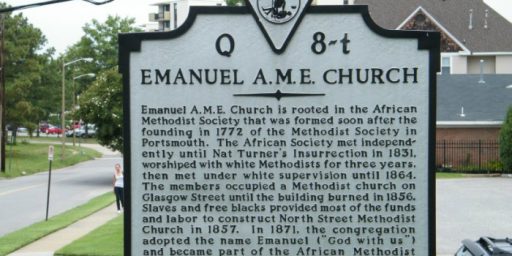DOJ’s Terrorism Statistics Seriously Flawed
An audit by the Department of Justice Inspector General found that all but two of DOJ’s 26 sets of statistics about terrorism prosecutions are inaccurate.
UPI’s Shaun Waterman:
[Glen] Fine’s office examined the accuracy of 26 sets of terrorism-related statistics produced by the FBI, the Justice Department’s Criminal Division, and its Executive Office for United States Attorneys, “to help measure the department’s counterterrorism efforts.” “These statistics are reported to senior department managers, Congress, and the public in various reports, budget documents, and testimony,” said the statement, adding that auditors had chosen the figures they did “based on our assessment of the significance of the statistics to the department’s counter-terrorism efforts.”
[…]
Eleven sets of statistics, including three relating to terror cases from Financial Years 2001-2002 were under-reported, 10 were over-reported, two were accurately reported, and three statistics that were reported multiple times were both under- and over-reported.
The statement called the department’s collection and reporting of terrorism statistics “decentralized and haphazard.” “We found many cases involving offenses such as immigration violations, marriage fraud, or drug trafficking where Department officials provided no evidence to link the subject of the case to terrorist activity,” it added.
In its response, the department said the poor counting reflected the strain officials were under in the wake of the 2001 terror attacks, when “substantial reorganizations and … unprecedented focus on preventing future terrorist attacks … strained internal systems designed to capture performance data.” It said many cases coded as anti-terrorist were “part of proactive initiatives designed to prevent terrorism by reducing vulnerabilities in critical facilities and systems nationwide.”
WaPo’s Dan Eggen adds,
The biggest problems were in numbers compiled by the Executive Office of U.S. Attorneys, which counted hundreds of terrorism cases that did not qualify for the designation because they involved minor crimes with no connection to terrorist activity, the report said.
[…]
The Justice Department said in a statement that it has already made most of the improvements suggested by Fine’s office and that the U.S. attorneys’ office would rename its “anti-terrorism” category to remove the implication that every case involves terrorism.
[…]
The data are used to justify expenditures and explain to Congress and to the public how the Justice Department is using its resources to protect the country against terrorist attacks, officials said.
Doug Farrah thinks the IG report overstates the problem, noting, it would be
. . . wrong to summarily discount the cases made against suspected terrorists on other charges, because those are the charges that could be brought. The notion that cases involving drug trafficking, marriage fraud and other things are unrelated to terrorism is simply naive and legalistic. Any of these crimes can (an perhaps have been) used to further terrorist activities in this country.
Under the IG’s thinking, Al Capone would have counted as a tax case, not an organized crime case, because he was put out of business on tax charges. He would have been convicted of only minor crimes with no connection to organized criminal activity.
Making terrorism cases stick is difficult, time consuming and expensive. The practitioners of terrorism are well versed in denial and deception, covering their tracks and skirting the law. This leaves DOJ often with the option of going for what it can get rather than what it would like in a perfect world.
That’s no doubt true. Then again, the DOJ is a bureaucracy and, like all bureaucracies, operates with under bizarre incentive structures. Given the post-9/11 mandate to reorient toward “counterterrorism,” which naturally means funding, promotions, and other rewards are tied to how well it can be justified in terms of that mission, it’s hardly surprising that things that were previously treated as “crime” suddenly became “terrorist activity.”
Both the WaPo and UPI account use the phrase “minor crimes with no connection to terrorist activity,” albeit without quotes, so I presume that this language came from the IG report. If so, I tend to believe that most of the should-have-been-excluded cases were actually completely unrelated to terrorist activity.






A government bureaucracy exaggerates and fudges information. Shocking, I say!
I think the IG report got that right actually. Under the “Innocent until proven guilty” philosophy, your case is not “terrorism related” unless you are charged with something “terrorism related”. Sure someone trafficking drugs can also be involved in terrorism activities, but that is not a required relationship, so being charged with drug trafficking doesn’t make your case terrorism related, you need more than that.
It’s like writing someone a speeding ticket, and then incrementing your count of vehicular homicide preventions, is misrepresentation.